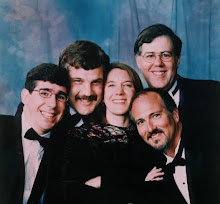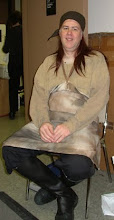Opera Platform is offering a performance of Eugene Onegin from the Komische Oper Berlin. This is an overall very good production and performance. The production by Barrie Kosky itself was fairly traditional, the setting for Acts 1 and 2 being a lush green outdoor setting, a meadow on the edge of a forest. This setting was effective for a lot of these scenes, but not for all. Tatiana's letter scene was a stretch for me. I couldn't quite understand how a teenage girl would be allowed to simply wander around outside in the middle of the night (her grandmother knows she is there). The canning of raspberry jam was a nice touch, but it was a device that got a little old after a while. The other problem with the letter scene is that Tatiana had no paper, so she had to resort to tearing pages out of her book and writing on those pages. This powerful scene lost some of its power due to this setting I felt, despite the beautifully acted and sung performance of Asmik Grigorian as Tatiana.
But we are not done with this setting. The duel happens here too. That is fine and I won't give it all away except to say that I felt that a couple of the director's choices for this scene robbed the scene of its emotional power. It is ironic because on the one hand the performance of the principals was really outstanding, both in terms of their singing and acting. Lensky was portrayed as more troubled than is usual, and I felt that really worked. Well, so was Onegin actually and his final scene with Tatiana was powerfully performed. But I get ahead of myself. Now, we are in the theater so I can make the shift in my mind that the meadow in the last scene of the last act is not really the same meadow as the first two acts - in fact it is not supposed to be. Tatiana has married Prince Gremin and they live in St. Petersburg in act 3. And for a production as basically traditional as this one this was certainly my assumption. But then how is it possible that there in the grass they find the glass jar with Tatiana's letter in the very last scene of the opera. That was a major disconnect for me. Years have supposedly gone by. Onegin has been wandering around Europe in an effort to deal with his terrible guilt for having killed Lensky and Tatiana has gotten married and is now the Princess Gremin and the center a some major social activity in St. Petersburg, but yet here is that letter. But aside from those kinds of little things, there is much that works very, very well. I loved the rain, for example. It added to the power of the last scene of the opera. I liked that the male characters were less restrained and had more depth. I loved the way Grigorian played Tatiana. She was not played as shy so much I thought as just bookish and introverted, but nevertheless a girl capable of intense feelings. I also loved the interaction of all the women leads in act 1. This is a loving family - these 3 generations of women have genuine affection for one another and it was beautifully played. Into this then comes these damaged and difficult men. Lensky with his brooding bad temper and alcohol problem and the arrogant Onegin. And when we finally do meet Prince Gremin we discover that Tatiana has not settled, but has found a man who genuinely loves her and she loves him back. And she is now not quite as withdrawn. The lovely gown she wore was representative I think of this transformation. She is now a woman - responsible and mature and strong. Onegin has no hope and his advances came off as pathetic. It was very effective.
I really liked Asmik Grigorian as Tatiana a lot. There was something about her performance that really touched my heart. Vocally she was secure I thought and exceptionally musical, but her embodiment of the character I felt was very moving. Günter Papendell was very effective as the arrogant and then desperate Onegin and the Czech tenor Ales Briscein was terrific as Lensky. The rest of the cast, the chorus and orchestra were all excellent. The conductor, Henrik Nanasi kept the opera well paced through out. I was disappointed I must say in the lack of dancing and dancers. This score contains some of Tchaikovsky's most wonderful dance music, which for the most part was performed as orchestra solos and moving music. There was very little dance - this is too bad. On the other hand, I should also say that one of the things that made this production work with its (for the most part) single setting in the meadow was the excellent lighting by Franck Evin. The lighting effects were simply gorgeous at times. This is a over all a fine Onegin and worth watching. Highly recommended.
Carmen Aldrich
8 years ago


